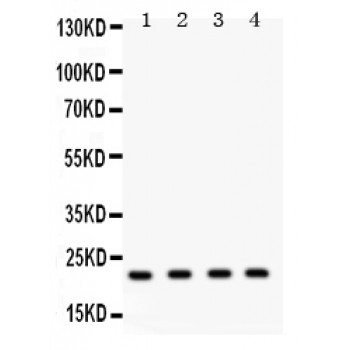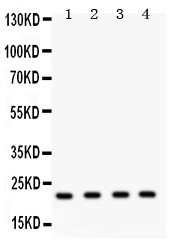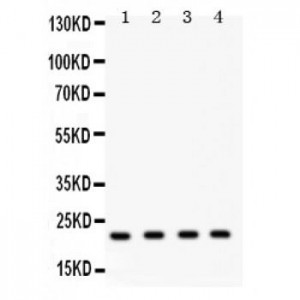More info
Overview
Long Name | Antibody Type | Antibody Isotype | Host | Species Reactivity | Validated Applications | Purification |
| pituitary tumor-transforming 1 | Polyclonal | IgG | Rabbit | Human | WB | Immunogen affinity purified. |
Immunogen | ||||||
| A synthetic peptide corresponding to a sequence at the C-terminus of human Securin(146-161aa LMILDEERELEKLFQL), different from the related rat sequence by four amino acids, and from the related mouse sequence by five amino acids. | ||||||
Properties
Form | Lyophilized |
Size | 100 µg/vial |
Contents | Antibody is lyophilized with 5 mg BSA, 0.9 mg NaCl, 0.2 mg Na2HPO4, 0.05 mg Thimerosal and 0.05 mg NaN3. *carrier free antibody available upon request. |
Concentration | Reconstitute with 0.2 mL sterile dH2O (500 µg/ml final concentration). |
Storage | At -20 °C for 12 months, as supplied. Store reconstituted antibody at 2-8 °C for one month. For long-term storage, aliquot and store at -20 °C. Avoid repeated freezing and thawing. |
Additional Information Regarding the Antigen
Gene | PTTG1 |
Protein | Securin |
Uniprot ID | O95997 |
Function | Regulatory protein, which plays a central role in chromosome stability, in the p53/TP53 pathway, and DNA repair. Probably acts by blocking the action of key proteins. During the mitosis, it blocks Separase/ESPL1 function, preventing the proteolysis of the cohesin complex and the subsequent segregation of the chromosomes. At the onset of anaphase, it is ubiquitinated, conducting to its destruction and to the liberation of ESPL1. Its function is however not limited to a blocking activity, since it is required to activate ESPL1. Negatively regulates the transcriptional activity and related apoptosis activity of TP53. The negative regulation of TP53 may explain the strong transforming capability of the protein when it is overexpressed. May also play a role in DNA repair via its interaction with Ku, possibly by connecting DNA damage-response pathways with sister chromatid separation. |
Tissue Specificity | Expressed at low level in most tissues, except in adult testis, where it is highly expressed. Overexpressed in many patients suffering from pituitary adenomas, primary epithelial neoplasias, and esophageal cancer. |
Sub-cellular localization | Cytoplasm. Nucleus. |
Sequence Similarities | Belongs to the securin family. |
Aliases | EAP1 antibody|PTTG antibody|TUTR1 antibody|Hpttg antibody|TUMOR-TRANSFORMING 1 antibody|Esp1-associated protein antibody|ESP1-ASSOCIATED PROTEIN 1 antibody|Tumor-transforming protein 1 antibody|Pituitary tumor-transforming gene 1 protein antibody |
Application Details
| Application | Concentration* | Species | Validated Using** |
| Western blot | 0.1-0.5μg/ml | Human | AssaySolutio's ECL kit |
AssaySolution recommends Rabbit Chemiluminescent WB Detection Kit (AKIT001B) for Western blot. *Blocking peptide can be purchased at $65. Contact us for more information

Anti-Securin antibody, ASA-B1663, Western blotting
All lanes: Anti PTTG1 (ASA-B1663) at 0.5ug/ml
Lane 1: HELA Whole Cell Lysate at 40ug
Lane 2: MCF-7 Whole Cell Lysate at 40ug
Lane 3: SKOV Whole Cell Lysate at 40ug
Lane 4: A375 Whole Cell Lysate at 40ug
Predicted bind size: 22KD
Observed bind size: 22KD
All lanes: Anti PTTG1 (ASA-B1663) at 0.5ug/ml
Lane 1: HELA Whole Cell Lysate at 40ug
Lane 2: MCF-7 Whole Cell Lysate at 40ug
Lane 3: SKOV Whole Cell Lysate at 40ug
Lane 4: A375 Whole Cell Lysate at 40ug
Predicted bind size: 22KD
Observed bind size: 22KD



